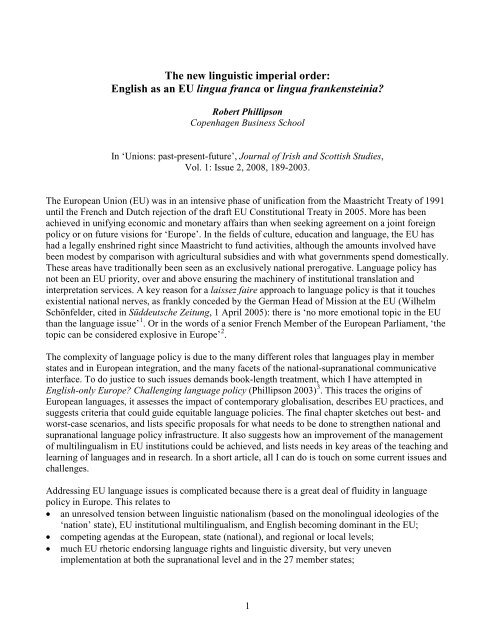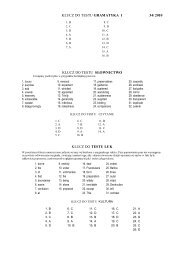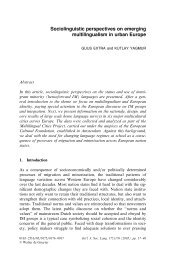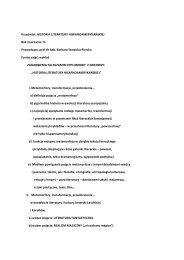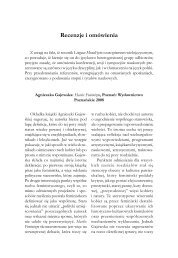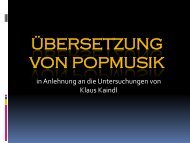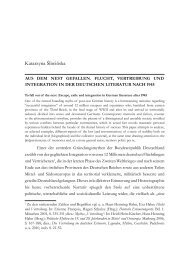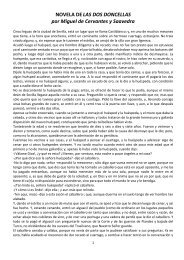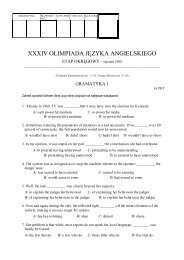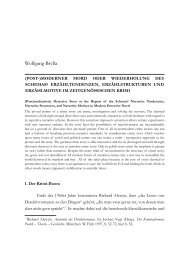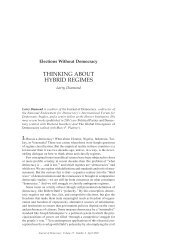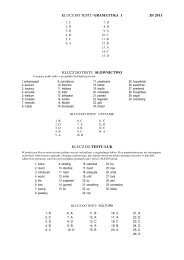R20 Phillipson 2008 English in EU lingua frankensteinia.pdf
R20 Phillipson 2008 English in EU lingua frankensteinia.pdf
R20 Phillipson 2008 English in EU lingua frankensteinia.pdf
- No tags were found...
Create successful ePaper yourself
Turn your PDF publications into a flip-book with our unique Google optimized e-Paper software.
• <strong>in</strong>creas<strong>in</strong>g grassroots and elite bi- and multil<strong>in</strong>gualism, except <strong>in</strong> the UK and among the oldergeneration <strong>in</strong> other demographically large <strong>EU</strong> countries;• a largely uncritical adoption of englishisation, <strong>English</strong> as the l<strong>in</strong>gua economica or l<strong>in</strong>guaamericana.At the political level, there is a mismatch between the broad sweep of Article 22 of The Charter ofFundamental Rights of the European Union (approved by heads of state but currently on hold as aresult of the constitutional crisis) – ‘The Union shall respect cultural, religious and l<strong>in</strong>guistic diversity’- and the realities of how this is <strong>in</strong>terpreted. The most extreme form of declar<strong>in</strong>g that the Charter’scommitment is merely hot air was given voice by a senior French civil servant <strong>in</strong> a conference paper <strong>in</strong>the USA. Yves Marek, counsellor to Jacques Toubon 4 when M<strong>in</strong>ister of Culture and Francophonie,claims blandly that ‘<strong>in</strong> the field of l<strong>in</strong>guistic rights, like <strong>in</strong> other fields of human rights, there is no rightbut only … politics.’ He also claimed that French understand<strong>in</strong>gs of national languages underlie howthe <strong>EU</strong> handles multil<strong>in</strong>gualism, and that <strong>in</strong> France there are no l<strong>in</strong>guistic m<strong>in</strong>orities, hence ‘nodiscrim<strong>in</strong>ation between so-called m<strong>in</strong>orities’ (for analysis, see <strong>Phillipson</strong> 2003, 45-47). It is unusual fora government representative to be so openly cynical. It also exemplifies why it is so difficult to formpolicies <strong>in</strong>spired by human rights pr<strong>in</strong>ciples at the supranational level.An additional factor that muddies the language policy <strong>in</strong>ternational waters is that basic concepts likelanguage, dialect and nation mean different th<strong>in</strong>gs <strong>in</strong> each language and state. Some countries arebased on ethnol<strong>in</strong>guistic criteria, the cultural nation, as <strong>in</strong> Germany (Herder, Blut und Boden), otherson a political, republican pr<strong>in</strong>ciple rather than consangu<strong>in</strong>ity, as <strong>in</strong> France. Semantic mismatches,deeply embedded <strong>in</strong> different conceptual universes and cosmologies, <strong>in</strong>evitably make <strong>in</strong>ternational‘understand<strong>in</strong>g’ problematical. In addition, each country has evolved legal systems along dist<strong>in</strong>ctnational l<strong>in</strong>es over centuries, with the consequence that when the rule of law and European legislation,which overrides national law, are supposed to have the ‘same mean<strong>in</strong>g’ <strong>in</strong> 23 languages and 27 states,European union <strong>in</strong> the sense of uniformity is an illusion. Even such an apparently straightforwardconcept as work<strong>in</strong>g language is used <strong>in</strong>consistently <strong>in</strong> media and political discourse, by both senior <strong>EU</strong><strong>in</strong>siders and journalists. The result is often to obscure what rights speakers of various languages have <strong>in</strong>the <strong>EU</strong> system or <strong>in</strong> <strong>in</strong>teract<strong>in</strong>g with it. Analysis of <strong>EU</strong> language regimes is also often blurred becauseit is unclear whether what is be<strong>in</strong>g referred to relates to a specific <strong>in</strong>stitution, to speech or writ<strong>in</strong>g, or toa citizen <strong>in</strong> contact with the <strong>EU</strong>.These problems are compounded by the fact that the <strong>EU</strong> is purs<strong>in</strong>g language policies that negate eachother. On the one hand it proclaims a commitment to multil<strong>in</strong>gualism and l<strong>in</strong>guistic diversity. On theother, many of its work<strong>in</strong>g practices and policies strengthen <strong>English</strong> at the expense of (speakers of)other languages. This is, for <strong>in</strong>stance, the case with the Bologna process, a key <strong>EU</strong> project with the veryambitious goal of <strong>in</strong>tegrat<strong>in</strong>g the research and higher education systems of 45 European countries (withAustralia and the USA as observers, s<strong>in</strong>ce higher education is big bus<strong>in</strong>ess for them) <strong>in</strong>to a s<strong>in</strong>gle,unified ‘area’, i.e. market. This ‘<strong>in</strong>ternationalisation’ is <strong>in</strong> theory committed, by the orig<strong>in</strong>al Bolognadeclaration of 1999 ‘with<strong>in</strong> the framework of our <strong>in</strong>stitutional competences and tak<strong>in</strong>g full respect ofthe diversity of cultures, languages, national education systems and of University autonomy - toconsolidate a European Higher Education Area at the latest by 2010’. At the bi-annual m<strong>in</strong>isterialmeet<strong>in</strong>gs (most recently <strong>in</strong> Bergen <strong>in</strong> 2005 and London <strong>in</strong> 2007), the ma<strong>in</strong> focus has been on structural2
create a federal Europe on the model of the USA, the Americans were shrewd enough to <strong>in</strong>fluencepolicies decisively but to rema<strong>in</strong> discreetly <strong>in</strong> the background.By contrast there are now regular <strong>EU</strong>-US summit meet<strong>in</strong>gs. At the 2007 meet<strong>in</strong>g, a TransatlanticEconomic Integration Plan was endorsed, as well as coord<strong>in</strong>ation of foreign policy globally. In effectthis means that the <strong>EU</strong> accepts corporate America’s global agenda, as loyal but junior partners. This fitswell with the neoliberal project for the New American Century that was hatched by the likes ofCheney, Wolfowitz, and Rumsfeld <strong>in</strong> the late twentieth century (www.newamericancentury.org), asassessed <strong>in</strong> Harper’s Magaz<strong>in</strong>e 305 <strong>in</strong> 2002 (by D. Armstrong, cited <strong>in</strong> Harvey 2005, p. 80).The plan is for the United States to rule the world. The overt theme is unilateralism, but itis ultimately a story of dom<strong>in</strong>ation. It calls for the United States to ma<strong>in</strong>ta<strong>in</strong> its militarysuperiority and prevent new rivals from ris<strong>in</strong>g up to challenge it on the world stage. Itcalls for dom<strong>in</strong>ion over friends and enemies alike. It says not that the United States mustbe more powerful, or most powerful, but that it must be absolutely powerful.The dom<strong>in</strong>ion over friends has been worked through <strong>in</strong> the European Round Table of Industrialists, theTransatlantic Bus<strong>in</strong>ess Dialogue, and the Transatlantic Economic Partnership (Monbiot 2000) as wellas <strong>in</strong> all the ma<strong>in</strong> <strong>in</strong>ternational fora. The UK has spearheaded the adoption of this model <strong>in</strong> Europe,with its key role <strong>in</strong> global f<strong>in</strong>ance and its energetic military engagements as visible symptoms ofcommitment to US strategic <strong>in</strong>terests.In the <strong>EU</strong> system the way <strong>English</strong> l<strong>in</strong>guistic hegemony is asserted can be seen <strong>in</strong> the figures for choiceof language over the past 40 years <strong>in</strong> the <strong>in</strong>itial draft<strong>in</strong>g of <strong>EU</strong> texts. These reveal a dramatic decl<strong>in</strong>e <strong>in</strong>the use of German and French, and a progressive and accelerat<strong>in</strong>g <strong>in</strong>crease <strong>in</strong> the use of <strong>English</strong> as thedefault <strong>in</strong>-house language. This clearly strengthens the <strong>in</strong>terests of the <strong>English</strong>-speak<strong>in</strong>g member states,and of the countries <strong>in</strong> northern Europe where proficiency <strong>in</strong> <strong>English</strong> tends to be high 7 .French German Other <strong>English</strong>1970 60% 40% 0% 0%1996 38% 5% 12% 46%2004 26% 3% 9% 62%2006 14% 3% 11% 72%Is it reasonable and correct then to refer to <strong>English</strong> simply as a l<strong>in</strong>gua franca? The orig<strong>in</strong>s of the term,its vary<strong>in</strong>g senses and uses, and the implications of misus<strong>in</strong>g it <strong>in</strong> an age of US-dom<strong>in</strong>ated empire havebeen explored (<strong>Phillipson</strong> forthcom<strong>in</strong>g) as well as the history of the <strong>in</strong>tensive promotion of <strong>English</strong><strong>in</strong>ternationally s<strong>in</strong>ce the 1950s (<strong>Phillipson</strong> 1992). A few key po<strong>in</strong>ts can be summarised here.Reference to <strong>English</strong> as a l<strong>in</strong>gua franca generally seems to imply that the language is a neutral<strong>in</strong>strument for ‘<strong>in</strong>ternational’ communication between speakers who do not share a mother tongue. Thefact that <strong>English</strong> is used for a wide range of purposes, nationally and <strong>in</strong>ternationally, may mislead one<strong>in</strong>to believ<strong>in</strong>g that l<strong>in</strong>gua franca <strong>English</strong> is disconnected from the many purposes it serves <strong>in</strong> keysocietal doma<strong>in</strong>s. <strong>English</strong> might be more accurately described as a l<strong>in</strong>gua economica (<strong>in</strong> bus<strong>in</strong>ess and4
advertis<strong>in</strong>g, the language of corporate neoliberalism), a l<strong>in</strong>gua emotiva (the imag<strong>in</strong>ary of Hollywood,popular music, consumerism and hedonism), a l<strong>in</strong>gua academica (<strong>in</strong> research publications, at<strong>in</strong>ternational conferences, and as a medium for content learn<strong>in</strong>g <strong>in</strong> higher education), or a l<strong>in</strong>guacultura (rooted <strong>in</strong> the literary texts of <strong>English</strong>-speak<strong>in</strong>g nations that foreign language learn<strong>in</strong>gtraditionally aims at, and <strong>in</strong>tegrates with language learn<strong>in</strong>g as one element of general education).<strong>English</strong> is def<strong>in</strong>itely the l<strong>in</strong>gua bellica of wars between states (aggression by the US and its loyalacolytes <strong>in</strong> Afghanistan and Iraq, build<strong>in</strong>g on the presence of US bases <strong>in</strong> hundreds of countriesworldwide). The worldwide presence of <strong>English</strong> as a l<strong>in</strong>gua americana is due to the massive economic,cultural and military impact of the USA.Labell<strong>in</strong>g <strong>English</strong> as a l<strong>in</strong>gua franca, if this is understood as a culturally neutral medium that putseveryone on an equal foot<strong>in</strong>g, is simply false. It is an <strong>in</strong>vidious term if the language <strong>in</strong> question is a firstlanguage for some people but for others a foreign language. It is mislead<strong>in</strong>g if the language is supposedto be disconnected from culture and very specific purposes. It is an <strong>in</strong>accurate term for a language thatis taught as a subject <strong>in</strong> general education. Ironically, there is a historical cont<strong>in</strong>uity <strong>in</strong> the way the termorig<strong>in</strong>ated (from Arabic) as a designation for the hybrid language of European crusaders who were outto elim<strong>in</strong>ate Islam from Asia M<strong>in</strong>or, while now <strong>English</strong> is viscerally connected to the crusade of globalcorporatisation, marketed as freedom and democracy (Poole 2007). Human rights have been droppedfrom this rhetoric, as they are manifestly no longer on the agenda, except when criticis<strong>in</strong>g ‘enemies’.The role of the British, especially Tony Blair, <strong>in</strong> this global scenario, is captured by the playwrightDavid Hare:it is now impossible to imag<strong>in</strong>e any American foreign policy, however irrational, howeverdangerous, however illegal, with which our present Prime M<strong>in</strong>ister would not declarehimself publicly delighted and thrilled. […] They know we have voluntarily surrenderedour wish for an <strong>in</strong>dependent voice <strong>in</strong> foreign affairs. Worse, we have surrendered it to acountry which is actively seek<strong>in</strong>g to underm<strong>in</strong>e <strong>in</strong>ternational organisations and<strong>in</strong>ternational law. Lack<strong>in</strong>g the gun, we are to be only the mouth. The deal is this: Americaprovides the firepower. We provide the bullshit. (Hare 2005, 207, 208)The elim<strong>in</strong>ation of l<strong>in</strong>guistic diversity has been an explicit goal of states attempt<strong>in</strong>g to imposemonol<strong>in</strong>gualism with<strong>in</strong> their borders: l<strong>in</strong>guicist policies favour the l<strong>in</strong>gua frankenste<strong>in</strong>ia and lead tol<strong>in</strong>guicide (Skutnabb-Kangas and <strong>Phillipson</strong> 1996). This was the case <strong>in</strong> the <strong>in</strong>ternal colonisation of theBritish Isles and <strong>in</strong> most Europeanised parts of the world. Skutnabb-Kangas (2000) avoids seem<strong>in</strong>gly<strong>in</strong>nocuous terms like ‘language death’ and ‘language spread’, concepts that obscure agency, byreferr<strong>in</strong>g to killer languages, language murder, and l<strong>in</strong>guistic genocide, bas<strong>in</strong>g this term on def<strong>in</strong>itions<strong>in</strong> <strong>in</strong>ternational human rights law and the historical evidence of government policies. Swales (1996),after a lifetime of work on scientific <strong>English</strong>, is so concerned about other languages of scholarshipbe<strong>in</strong>g on the way to ext<strong>in</strong>ction that he labels <strong>English</strong> a l<strong>in</strong>gua tyrannosaura. The widespread concern <strong>in</strong>political and academic circles <strong>in</strong> Scand<strong>in</strong>avian countries with doma<strong>in</strong> loss signifies a perception thatsegments of the national language are at risk from the <strong>English</strong> monster, hence the concern that Danish,Norwegian and Swedish should rema<strong>in</strong> fully operational <strong>in</strong> all doma<strong>in</strong>s.There are many dist<strong>in</strong>guished European voices that reject the prospect of <strong>English</strong> becom<strong>in</strong>g the solelanguage to unify Europe. For George Ste<strong>in</strong>er (2000), ‘a global mass media créole founded on5
American <strong>English</strong> is a soul-destroy<strong>in</strong>g prospect. So is the cont<strong>in</strong>uation of <strong>in</strong>flamed regionalism andlanguage hatreds’. For Pierre Bourdieu (2001), globalisation simply means Americanisation:<strong>English</strong>isation entails symbolic imperialism and l<strong>in</strong>guistic hegemony. He accuses speakers of thedom<strong>in</strong>ant language (currently <strong>English</strong>, and earlier French and German) of behav<strong>in</strong>g as though theirsymbolic forms and values are universal. For Étienne Balibar (2004, 230), follow<strong>in</strong>g Umberto Eco, ‘theonly genu<strong>in</strong>e “idiom of Europe” … is the practice of translation’, and ‘<strong>English</strong> cannot be the languageof Europe’.Such pronouncements presuppose proficiency <strong>in</strong> at least two languages, which is precisely what the <strong>EU</strong>and the Council of Europe recommend for all school pupils. The <strong>EU</strong> Commission has expanded itsactivities to strengthen multil<strong>in</strong>gualism (http://ec.europa.eu/education/policies/lang/languages_en.html)In Promot<strong>in</strong>g language learn<strong>in</strong>g and l<strong>in</strong>guistic diversity: An Action Plan 2004-2006, the message ishammered home that ‘learn<strong>in</strong>g one l<strong>in</strong>gua franca alone is not enough … <strong>English</strong> alone is not enough’.There is also a warn<strong>in</strong>g to cont<strong>in</strong>ental countries which have opted to start us<strong>in</strong>g <strong>English</strong> as a medium of<strong>in</strong>struction that ‘<strong>in</strong> non-anglophone countries recent trends to provide teach<strong>in</strong>g <strong>in</strong> <strong>English</strong> may haveunforeseen consequences on the vitality of the national language.’The ambitious Framework Strategy for Multil<strong>in</strong>gualism (2005) recommends that member statesundertake the follow<strong>in</strong>g:• the learn<strong>in</strong>g <strong>in</strong> education of mother tongue 8 plus two,• the formulation of national plans to give coherence and direction to actions to promotemultil<strong>in</strong>gualism, significantly <strong>in</strong>clud<strong>in</strong>g the teach<strong>in</strong>g of migrant languages,• improved teacher tra<strong>in</strong><strong>in</strong>g for foreign language learn<strong>in</strong>g,• early language learn<strong>in</strong>g,• Content and Language Integrated Learn<strong>in</strong>g (CLIL), i.e. the merg<strong>in</strong>g of a foreign language withanother school subject,• more study of multil<strong>in</strong>gualism <strong>in</strong> higher education,• <strong>in</strong>troduction of a European Indicator of Language Competence, a Europe-wide language test<strong>in</strong>gscheme,• greater use <strong>in</strong> language learn<strong>in</strong>g of Information Society technologies,• the harness<strong>in</strong>g of languages to ‘the multil<strong>in</strong>gual economy’.There has been s<strong>in</strong>ce January 2007 a Commissioner with a portfolio to promote multil<strong>in</strong>gualism,Leonard Orban from Romania. In his many speeches at conferences all over Europe, he stresses three<strong>in</strong>terlock<strong>in</strong>g goals:• ‘promot<strong>in</strong>g the cultural dimension of languages to build <strong>in</strong>clusive societies and develop<strong>in</strong>tercultural dialogue. I <strong>in</strong>tend to promote the learn<strong>in</strong>g of all languages present <strong>in</strong> the EuropeanUnion, <strong>in</strong>clud<strong>in</strong>g the languages of migrants […]• work with bus<strong>in</strong>ess, to help them identify how to build up their language capacities to enter newmarkets, and to improve job-satisfaction […]• a European space for dialogue with the citizens, to make sure that everyone can communicate withthe <strong>in</strong>stitutions <strong>in</strong> their language, that the Community legislation is available to everyone <strong>in</strong> theirlanguages.’ 96
What the local impact of any of these <strong>in</strong>itiatives and <strong>EU</strong> ‘actions’ will be is impossible to predict, s<strong>in</strong>ceit is entirely up to member states to follow or to ignore what ‘Brussels’ decides. The same is true of araft of language policy activities that the Council of Europe engages <strong>in</strong>. Language policy issues do notfigure prom<strong>in</strong>ently on the agendas of the meet<strong>in</strong>gs of <strong>EU</strong> M<strong>in</strong>isters of Education. There is a modestsystem of report<strong>in</strong>g back to the Commission regularly on implementation, which may or may notrepresent nam<strong>in</strong>g and sham<strong>in</strong>g (s<strong>in</strong>ce the m<strong>in</strong>utes of some meet<strong>in</strong>gs are available on the <strong>in</strong>ternet).Though there is <strong>in</strong>creas<strong>in</strong>g evidence of the Commission draw<strong>in</strong>g on advice from <strong>in</strong>dependent experts, itis doubtful whether the career eurocrats who at any po<strong>in</strong>t of time might be attached to a languagepolicy unit are professionally qualified for liais<strong>in</strong>g with national authorities or educationalists andmak<strong>in</strong>g an impact. They might just as well be deal<strong>in</strong>g with fish quotas, energy, or air pollution, andmay well be do<strong>in</strong>g so <strong>in</strong> their next post<strong>in</strong>g.This worry applies equally strongly to the European Parliament. When debat<strong>in</strong>g the FrameworkStrategy for Multil<strong>in</strong>gualism, a majority <strong>in</strong> the Parliament refused to approve a set of measures forstrengthen<strong>in</strong>g work on language policies that had been recommended unanimously by the Parliament’sCommittee on Culture and Education. Essentially this meant that l<strong>in</strong>guistic nationalists schooled <strong>in</strong>monol<strong>in</strong>gualism did not wish to promote multil<strong>in</strong>gualism nationally and failed to connect this defensivestance to the changes <strong>in</strong> language use that globalisation and European <strong>in</strong>tegration are br<strong>in</strong>g<strong>in</strong>g about.On one of the rare occasions when the <strong>EU</strong> did commission a serious study of some language policyissues, it decided <strong>in</strong>ternally and totally undemocratically to ignore the advice they received. Afeasibility study concern<strong>in</strong>g the creation of a European Agency for L<strong>in</strong>guistic Diversity and LanguageLearn<strong>in</strong>g was requested by European Parliament, and commissioned by the Directorate General forEducation and Culture. The task was given to Yellow W<strong>in</strong>dow Associates, a consultancy with wideexperience of servic<strong>in</strong>g <strong>EU</strong> <strong>in</strong>stitutions. Their mandate excluded attention to the <strong>in</strong>ternal work<strong>in</strong>gs of<strong>EU</strong> <strong>in</strong>stitutions and migrant languages. Their report, of 18 May 2005, was made available on the DG’swebsite. The detailed (118 pp) study, on the basis of extensive consultation with a wide range of peopleconcerned with many aspects of language policy, articulates an analysis of needs, conditions, andmodalities. The report confirms that a wealth of professional expertise exists that decision-makersought to draw on. It makes a strong case for either a L<strong>in</strong>guistic Agency, like other high-prestige <strong>EU</strong>agencies (deal<strong>in</strong>g with the environment <strong>in</strong> Copenhagen, and racism <strong>in</strong> Vienna), or alternatively anetwork of Language Diversity Centres to strengthen policy formation and implementation, particularlyfor regional m<strong>in</strong>ority languages. The feasibility study reveals a widespread perception that there is aserious need for policy advice and <strong>in</strong>formation for national and <strong>EU</strong> decision-makers. This wasoverwhelm<strong>in</strong>gly the case <strong>in</strong> new member states, whereas the established ones consider such functions‘not useful’. The same pattern holds for research <strong>in</strong>to language policy issues. There was also nearunanimity <strong>in</strong> responses <strong>in</strong> reject<strong>in</strong>g <strong>English</strong> as a sole l<strong>in</strong>gua franca. The study concludes that ‘A noactionscenario would seriously underm<strong>in</strong>e the credibility of the <strong>EU</strong> <strong>in</strong> this field’.In fact the L<strong>in</strong>guistic Agency proposal was rejected unilaterally by the Commission. What it has doneis to decide to support the Network on Promot<strong>in</strong>g L<strong>in</strong>guistic Diversity with<strong>in</strong> the framework of theprogramme ‘Integrated Lifelong Learn<strong>in</strong>g (2007-2013). But fund<strong>in</strong>g for ‘regional and m<strong>in</strong>oritylanguages’ has been significantly reduced, from 1.2 million euros annually to 149,000 euros annually 10 .This represents a massive downgrad<strong>in</strong>g of fund<strong>in</strong>g for languages. Whatever credibility the <strong>EU</strong> mighthave ga<strong>in</strong>ed by creat<strong>in</strong>g a portfolio for multil<strong>in</strong>gualism <strong>in</strong> its own right from 2007 is be<strong>in</strong>g seriously7
underm<strong>in</strong>ed by no-action on an Academy and reduced action on m<strong>in</strong>ority languages. Most of theCommissioner’s speeches consist of platitud<strong>in</strong>ous generalities about support for diversity and languagelearn<strong>in</strong>g, and it is probably <strong>in</strong> the nature of his role that they have to be.The f<strong>in</strong>al report of a High-Level Group on Multil<strong>in</strong>gualism was published on 26 September 2007(IP/07/1396; http://ec.europa.eu/education/policies/lang/doc/multireport_en.<strong>pdf</strong>), analys<strong>in</strong>g manyaspects of language policy and mak<strong>in</strong>g suggestions for activities to strengthen language learn<strong>in</strong>g. It waspublished <strong>in</strong> 22 languages (all official languages except Irish), reflect<strong>in</strong>g the importance of the project.The Group’s many proposals relate to rais<strong>in</strong>g awareness and enhanc<strong>in</strong>g motivation for languagelearn<strong>in</strong>g; the potential of the media <strong>in</strong> evok<strong>in</strong>g, enhanc<strong>in</strong>g and susta<strong>in</strong><strong>in</strong>g motivation for languagelearn<strong>in</strong>g; languages for bus<strong>in</strong>ess; <strong>in</strong>terpretation and translation, new trends and needs; regional orm<strong>in</strong>ority languages; and research <strong>in</strong>to multil<strong>in</strong>gualism. The key issue is whether <strong>EU</strong> or governmentfunds will be forthcom<strong>in</strong>g for implement<strong>in</strong>g such ideas.The up-beat nature of these ideas contrasts with many symptoms of crisis <strong>in</strong> language policy <strong>in</strong> Europe,such as foreign languages other than <strong>English</strong> be<strong>in</strong>g learned less, and the way market forces arestrengthen<strong>in</strong>g <strong>English</strong> <strong>in</strong> the Bologna process, as reported above, and <strong>in</strong> the <strong>in</strong>ternal management ofmultil<strong>in</strong>gualism <strong>in</strong> <strong>EU</strong> <strong>in</strong>stitutions. Translators and <strong>in</strong>terpreters for demographically ‘small’ languageslike Danish and Swedish, as well as the newly arrived Baltic and central European languages, areconv<strong>in</strong>ced that their languages are be<strong>in</strong>g treated as second-class. There is evidently a conflict betweenthe rhetoric of support<strong>in</strong>g all languages and the realities of l<strong>in</strong>guistic hierarchies and marg<strong>in</strong>alisation.Any more detailed analysis of the current role of <strong>English</strong> <strong>in</strong> Europe would need to see it <strong>in</strong> terms of the<strong>English</strong> language as project, as process, and as product. Nobody is question<strong>in</strong>g whether <strong>English</strong> oughtto be optimally learned or not. There is no dispute about the fact that proficiency <strong>in</strong> <strong>English</strong> ismassively useful <strong>in</strong> the modern world, and that <strong>English</strong> serves multiple purposes, some constructive,some benign, and some evil. But while <strong>English</strong> opens doors for some, it closes them for others. More<strong>in</strong>-depth research is needed <strong>in</strong>to how <strong>English</strong> functions globally and locally, for which the follow<strong>in</strong>gpo<strong>in</strong>ters may be useful.The l<strong>in</strong>gua franca/frankenste<strong>in</strong>ia project can be seen as entail<strong>in</strong>g• the imag<strong>in</strong><strong>in</strong>g of a community, <strong>in</strong> the same way as polities are imag<strong>in</strong>ed (Anderson1983), an <strong>English</strong>-us<strong>in</strong>g community without territorial or national boundaries;• the <strong>in</strong>vention of traditions (<strong>in</strong> the sense of Hobsbawm and Ranger 1983), customs,activities and discourses that connect people through a merg<strong>in</strong>g of the language withmultiple agendas at many levels, the local, the national, the European, the universaland global;• ultimately the project reflects metaphysical choices (Schumacher 1977) andphilosophical pr<strong>in</strong>ciples (Kant 2004) that underp<strong>in</strong> the type of community we wish tolive <strong>in</strong>, the beliefs, values, and ethical pr<strong>in</strong>ciples that guide us, <strong>in</strong> a world that iscurrently dom<strong>in</strong>ated by neoliberalism, unsusta<strong>in</strong>able consumerism, violence, andl<strong>in</strong>guistic neoimperialism (<strong>Phillipson</strong> <strong>in</strong> press);• our choices can either serve to ma<strong>in</strong>ta<strong>in</strong> diversity, biological, cultural and l<strong>in</strong>guistic() or to elim<strong>in</strong>ate it, and current trends are alarm<strong>in</strong>g;8
• all of which lead to visions of and for <strong>English</strong>, <strong>in</strong> Europe and elsewhere, and if thesedo not def<strong>in</strong>e l<strong>in</strong>gua franca <strong>in</strong> such a way as to ensure equality and symmetry <strong>in</strong><strong>in</strong>tercultural communication, but are essentially one-sided promotion of <strong>English</strong>, theproject tends to be more that of a l<strong>in</strong>gua frankenste<strong>in</strong>ia.The l<strong>in</strong>gua franca/frankenste<strong>in</strong>ia process can be seen as entail<strong>in</strong>g• build<strong>in</strong>g communities of practice, of language use and language learn<strong>in</strong>g• that people identify with at various levels• which can be personal, <strong>in</strong>terpersonal, <strong>in</strong>tercultural, and sub-cultural• <strong>in</strong> contexts of use, discourses, and doma<strong>in</strong>s• which conform to norms of l<strong>in</strong>guistic behaviour that are <strong>in</strong>stitutionally (re-)<strong>in</strong>forced,legitimated and rationalised,• <strong>in</strong> societies that hierarchise by means of race, class, gender, and language• lead<strong>in</strong>g to <strong>English</strong> be<strong>in</strong>g perceived as prestigious, ‘normal’, and normative, hence thefeel<strong>in</strong>g of native speakers that the language is universally relevant and usable, and theneed for others to learn and use the language, <strong>in</strong> some cases additively, <strong>in</strong> otherssubtractively.The l<strong>in</strong>gua franca/frankenste<strong>in</strong>ia product• <strong>in</strong>terlocks with economic/material systems, structures, <strong>in</strong>stitutions, and US empire• is supported ideologically <strong>in</strong> cultural (re-)production and consumption• <strong>in</strong> political, economic, military, media, academic and educational discourses• through narratives of the ‘story’, the ‘spread’ of <strong>English</strong>, language ‘death’ orl<strong>in</strong>guicide• through metaphors of <strong>English</strong> as ‘<strong>in</strong>ternational’, global, God-given, rich, its use be<strong>in</strong>g‘natural’ <strong>in</strong> the modern world• with the prestige code that of elites <strong>in</strong> the dom<strong>in</strong>ant <strong>English</strong>-speak<strong>in</strong>g countries, andembedded <strong>in</strong> the lexis and syntax of the language.Heuristic ways of clarify<strong>in</strong>g whether the advance of <strong>English</strong> represents l<strong>in</strong>gua franca rather than l<strong>in</strong>guafrankenste<strong>in</strong>ia trends would entail ask<strong>in</strong>g a series of questions, and relat<strong>in</strong>g each of them to <strong>English</strong> asproject, process and product:• Is the expansion and/or learn<strong>in</strong>g of <strong>English</strong> <strong>in</strong> any given context additive orsubtractive?• Is l<strong>in</strong>guistic capital dispossession of national languages tak<strong>in</strong>g place?• Is there a strengthen<strong>in</strong>g or a weaken<strong>in</strong>g of a balanced local language ecology?• Where are our political and corporate leaders tak<strong>in</strong>g us <strong>in</strong> language policy?• What is the role of <strong>English</strong> Studies <strong>in</strong> the contemporary world?• How can academics contribute to public awareness and political change?• If dom<strong>in</strong>ant norms are global, is <strong>English</strong> serv<strong>in</strong>g local needs or merely subord<strong>in</strong>at<strong>in</strong>gits users to the American empire project?9
Empirical studies of such questions are needed before firmer conclusions can be drawn, <strong>in</strong> tandem witha ref<strong>in</strong>ement of the theoretical framework for understand<strong>in</strong>g these changes <strong>in</strong> the global and locallanguage ecology.ReferencesAnderson, Benedict 1983. Imag<strong>in</strong>ed communities. Reflections on the orig<strong>in</strong> and spread of nationalism.London: Verso.Balibar, Étienne 2004. We, the people of Europe? Reflections on transnational citizenship. Pr<strong>in</strong>ceton:Pr<strong>in</strong>ceton University Press.Bourdieu, Pierre 2001. Contre-feux 2. Pour un mouvement social européen. Paris: Raisons d’agir.Hare, David 2005. Obedience, struggle and revolt. Lectures on theatre. London: faber and faber.Harvey, David 2005. The new imperialism. Oxford: Oxford University Press.Hobsbawm, Eric and Terence Ranger (eds.) 1983. The <strong>in</strong>vention of tradition. Cambridge: CambridgeUniversity Press.Holm, Erik 2001. The European anarchy. Europe’s hard road <strong>in</strong>to high politics. Copenhagen:Copenhagen Bus<strong>in</strong>ess School PressKant 2004. Kant Political writ<strong>in</strong>gs, ed. Hans Reiss. Cambridge: Cambridge University Press.Monbiot, George 2000. Captive state. The corporate takeover of Brita<strong>in</strong>. London: Macmillan.<strong>Phillipson</strong>, Robert 1992. L<strong>in</strong>guistic imperialism. Oxford: Oxford University Press.<strong>Phillipson</strong>, Robert 2003. <strong>English</strong>-only Europe? Challeng<strong>in</strong>g language policy. London: Routledge.<strong>Phillipson</strong> Robert 2006. <strong>English</strong> – a cuckoo <strong>in</strong> the European higher education nest of languages?European Journal of <strong>English</strong> Studies, 10/1, 13-32.<strong>Phillipson</strong>, Robert <strong>in</strong> press. The l<strong>in</strong>guistic imperialism of neoliberal empire. Critical Inquiry <strong>in</strong>Language Studies, 5/1, <strong>2008</strong>.<strong>Phillipson</strong>, Robert forthcom<strong>in</strong>g. L<strong>in</strong>gua franca or l<strong>in</strong>gua frankenste<strong>in</strong>ia? <strong>English</strong> <strong>in</strong> European<strong>in</strong>tegration and globalisation. Plenary lecture at the Nordic Association for <strong>English</strong> StudiesConference, Bergen, Norway, 24-26 May 2007. Submitted to World <strong>English</strong>es.Pieterse, Jan N. 2004. Globalization or empire. New York and London: Routledge.Poole, Stephen 2007. Unspeak. Words are weapons. London: Abacus.Schumacher, E.F. 1977. A guide for the perplexed. London: Jonathan Cape.Skutnabb-Kangas, Tove 2000. L<strong>in</strong>guistic genocide <strong>in</strong> education – or worldwide diversity and humanrights? Mahwah, NJ: Lawrence Erlbaum.Skutnabb-Kangas, Tove and Robert <strong>Phillipson</strong> 1996. L<strong>in</strong>guicide and L<strong>in</strong>guicism. In Kontaktl<strong>in</strong>guistik.Contact L<strong>in</strong>guistics. L<strong>in</strong>guistique de contact. E<strong>in</strong> Internationales Handbuch zeitgenössigerForschung. An International Handbook of Contemporary Research. Manuel <strong>in</strong>ternational desrecherches contempora<strong>in</strong>es. Volume 1. Goebl, Hans, Nelde, Peter H., Starý, Zdeněk & Wölck,Wolfgang (eds), Berl<strong>in</strong>: de Gruyter, 667-675.Smith, Neil 2003. American empire. Roosevelt’s geographer and the prelude to globalization. Berkeleyand Los Angeles, CA: University of California Press.Ste<strong>in</strong>er, George 2001. Speech <strong>in</strong> Oviedo, Asturias, Spa<strong>in</strong>,www.fpa.es/<strong>in</strong>g/premios/discursos/2001chy.htmlSwales, John 1996. <strong>English</strong> as ‘Tyrannosaurus Rex’. World <strong>English</strong>es 16/3, 373-382.W<strong>in</strong>and, Pascal<strong>in</strong>e 1993. Eisenhower, Kennedy, and the United States of Europe. New York: St10
Mart<strong>in</strong>’s Press.1 ‘Es gibt <strong>in</strong> der <strong>EU</strong> ke<strong>in</strong> emotionaleres Thema als Sprachen.’2 ‘Un sujet qui peut être qualifié d’explosif en Europe’. Pierre Lequiller, Président, réunion ouverte à l’ensemble desmembres français du Parlement Européen, le 11 ju<strong>in</strong> 2003, pour debattre le Rapport sur la diversité l<strong>in</strong>guistique au se<strong>in</strong> del’Union européenne, préparé par Michel Herbillon, auprès de la Délégation pour l’Union Européenne.3 A summary of the book can be downloaded from my homepage, www.cbs.dk/staff/phillipson.4 Toubon later became M<strong>in</strong>ister of Justice, so that the name given to the legislation <strong>in</strong> France aimed at stemm<strong>in</strong>g the tide ofthe <strong>in</strong>vasion of <strong>English</strong> <strong>in</strong> France <strong>in</strong> 1994 is popularly known as the Loi Toubon.5 The Royal Danish Academy of Letters and Sciences commissioned a study <strong>in</strong> the spr<strong>in</strong>g of 2007 that demonstrates howacademic freedom and the freedom of speech of academics are be<strong>in</strong>g restricted. The issues are explored <strong>in</strong> ‘Autonomy andcontrol: Danish university reform <strong>in</strong> the context of modern governance’, Susan Wright and Jakob Williams Ørberg,Learn<strong>in</strong>g and Teach<strong>in</strong>g: The International Journal of Higher Education <strong>in</strong> the Social Sciences (LATISS), <strong>2008</strong>, 1/1.6 Holm bewails the lack of vision of present-day European leaders, their petty national agendas and <strong>in</strong>ability to th<strong>in</strong>k longterm.7 It is, however, doubtful whether Dutch or Swedish <strong>in</strong>terests are served optimally when representatives of these countriesuse <strong>English</strong> <strong>in</strong> high-level negotiations. This issue, often po<strong>in</strong>ted out by <strong>in</strong>terpreters, can be addressed by analys<strong>in</strong>g how the<strong>in</strong>terpretation system operates, how it is managed and funded, and criteria of efficiency and equity <strong>in</strong> communication.8 Whether this refers to m<strong>in</strong>ority mother tongues or the dom<strong>in</strong>ant national language is left unclear.9 From ‘Languages are a bridge for <strong>in</strong>tercultural dialogue’, speech, Brussels, 29 June 2007 to The Group of Intellectuals forIntercultural Dialogue.10 Mercatornews 33, September 2007, reports: ‘this new network aims at the strengthen<strong>in</strong>g of Regional and M<strong>in</strong>orityLanguages throughout Europe has been established on the <strong>in</strong>itiative of the Welsh Language Board <strong>in</strong> Wales.The Mercator Research Centre is one of the partners of the network alongside with organisations and regional authoritiesfrom Wales, Catalonia, F<strong>in</strong>land (Swedish speakers), Estonia and Ireland. Around one half of a million euros has beenprovisioned for the new network for three years - the project partners/regional languages will f<strong>in</strong>ance the necessary equitycontribution. Until now, <strong>in</strong> the Action Programme 2004-2006, the Mercator Centres <strong>in</strong> Ljouwert, Aberysthwyth andBarcelona had received earmarked f<strong>in</strong>ancial support from the European Commission together with the European Bureau forLesser Used Languages (EBLUL). As a result of this ma<strong>in</strong>stream<strong>in</strong>g operation of the European Commission the total sum of<strong>EU</strong> fund<strong>in</strong>g for Regional and M<strong>in</strong>ority Languages has decl<strong>in</strong>ed from 1,2 million euros annually to 149.000 euros annually.’11


